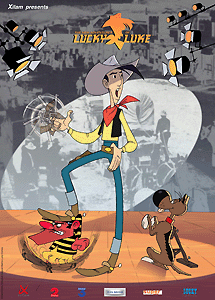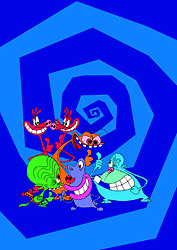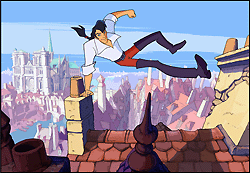Marie Beardmore sits down with Marc du Pontavice to learn about the many facets of Xilam as it takes to television, gaming, the Web, features and more.

All eyes were on Marc du Pontavice when he spun Xilam out of the former Gaumont Multimedia in 1998. But then having been the head of one of the most successful animation companies in France, he's used to the limelight. The company had enjoyed a successful run from 1985 to 1998 but troubled times for parent Gaumont wrote its obituary. Gaumont, the parent company, diverted funds from Gaumont Multimedia into its troubled French multiplex theatres and for this signaled the end of the growth of his division.
It was time to move on. He left Gaumont in December 1998 as CEO, but remained at the studio as a freelance executive producer for the second season of Oggy and the Cockroaches. While doing so, he was developing his own shows (including Lucky Luke) for his new company, Xilam. He says: "During the year 1999, from that position, I could clearly understand that Gaumont was no longer very committed to the development of the animation business. As a result of which my proposal to take over the studio and the library came for them as a relief. And we closed this take over deal in December 1999."

A Diversified Studio
Now firmly ensconced in his old studio, but at the helm of his own company, du Pontavice is putting into play a different form of economic model than that of most studios. He's looking beyond TV to film and games and expects to have a third of the business TV, a third games and a third films within two years. The TV distribution business is partnered by IGEL. It's a 50/50 deal for the catalogue but IGEL is not a shareholder in Xilam, or vice versa. It's a structure he's happy with now as it means he's free to develop and produce shows, which is what he likes to do.
The growth of the telly animation industry and particularly its rapid acceleration has been startling. He casts a weathered eye over the current state of play: "This business invested massive growth between 1993 and 1998. It was supposed to fall in 1999 but because of an increase in the stock market, continued to grow." After years of following the stock market, people are now becoming more real and realizing that the future is still in the business of buying and selling programs -- the TV market, not the hyped and exaggerated business of the stock market. And so, he says, there's been a consolidation of the animation business: "less crazy, but definitely healthier. It's good for those committed to the market."

TV Strategies
One of the downsides of the European stock-fuelled boom is the library's full of product currently stagnating in companies throughout Europe, but notably Germany. "A lot of these companies have not had their costs amortized at all," he notes. Some of these shows have not been seen internationally. Playing the stock market card is a risky business and more suited to the film industry than TV, says du Pontavice. The upside can be huge, but so can the outlay, and the damage if it goes wrong. "Apart from being a gamble, it's also an inappropriate strategy for TV," he says. "You can't speculate on TV like you can in film. You can't dream of making a fortune out of one show. You can make a nice business, but not massive wealth." He advises caution to would be producers: "No one should start production without 75% of the market financing in place," meaning the key economic countries to bring in the funding.
At Xilam, he's concerned about delivering shows that are better than the ones before, but then he says he always has been. At the new place, he's embarked on a strategy of alternating a classic property with an original one. So far the former is Lucky Luke and the later is Rapido. He wanted to do Rapido because it smacked of the cartoony Oggy and the Cockroaches, but with talking. Meanwhile, another classic property is already lined up, though du Pontavice is coy to reveal it just yet. Gaumont Multimedia was known for its success in the U.S. so no surprise that du Pontavice is gearing up his shows to sell there. Rapido has been developed with the U.S. market in mind and with his track record at Gaumont Multimedia, this is a man who knows all about how to do that. He elaborates on some key points: "There's a pacing issue in the story, which is a very important element." And unwritten censorship is a bugbear: "There's a very complex, non-written censorship system which has to be navigated."

Closer to home, changes are expected (and eagerly) in the French domestic market. A law is about to change in favour of the producers and du Pontavice couldn't be happier. Although the precise details of the law have yet to be made known, the basis of it is a fairer deal for producers. It will mean the broadcaster has no share in a show, but rather will pay a license fee to independent producers. It will strengthen the position of producers by ending the unlimited runs and unlimited license periods that some French broadcasters have enjoyed at the producer's expense.
Asked about toy driven properties, du Pontavice says the days of the completely toy-driven programs are over. Merchandising is a law unto itself though. "I've learnt to understand that you can't predict merchandising. You should be ready for it when it happens. People should get organized to take advantage, but should not write it into the business plan."

The Other Promising Avenues
He's going large on games, the second part of his strategy for the company. Stupid Invaders is Xilam's flagship game based on the wacky TV series Home To Rent or Space Goofs, depending on which side of the pond you live. The experience of transferring a successful TV show into a game format has been a learning curve for the Xilam team. It's a rich man's game. "The economic model for games is very different. You have to bear the burden of the development costs," he says. Investors won't commit to something on paper, so the producer has to bear those costs, which could be as much as $500,000. Once the development is in place, the next stage is to find a distributor. It's an economic model that's much closer to the cinema business, explains du Pontavice. "A strong upside but also a chance of falling back." But he's bullish about Xilam's chances in the sector. Stupid Invaders has just had a U.S. release for PC. A Dreamcast version will be out in May and the Play Station 2 in October/November this year. The game has 75 minutes of full 3D cinematic footage and some new characters.
Since you can't talk about animation these days without mentioning the "W" word, what are Xilam's plans for the Web? Xilam now has 8 people working full out on Web activities. He hopes to have 25-30 different programs out by the end of the year. "They're not expensive to make, between $10,000 - $50,000 each, but they add up." Super RTL has already bought four Xilam Web games. du Pontavice is most proud of Oggymotchi -- it's like a Tamagotchi but based on the character Oggy from Oggy and the Cockroaches.

Having got the TV business and the interactive business ticking along nicely, du Pontavice now has the third part of his strategy in his sights -- the film industry. The time is right, he says. "There's definitely a growing demand for looking to non-American animated movies but few studios are able to deliver, and that's what's holding things back. Very few animation studios are ready to make that move." He continues: "It requires a very significant and complex move towards talent. Producing a feature film is a very different model than TV. We need to meet the demand. Otherwise the audience will be disappointed." So Xilam is forging ahead with its movie plans then? "Of course, yeah, big time," says du Pontavice.
Marie Beardmore is a U.K.-based freelance writer who specializes in writing and consulting in the animation industry. She has just written a report on the global animation business for Channel 21 magazine.








